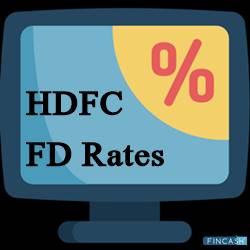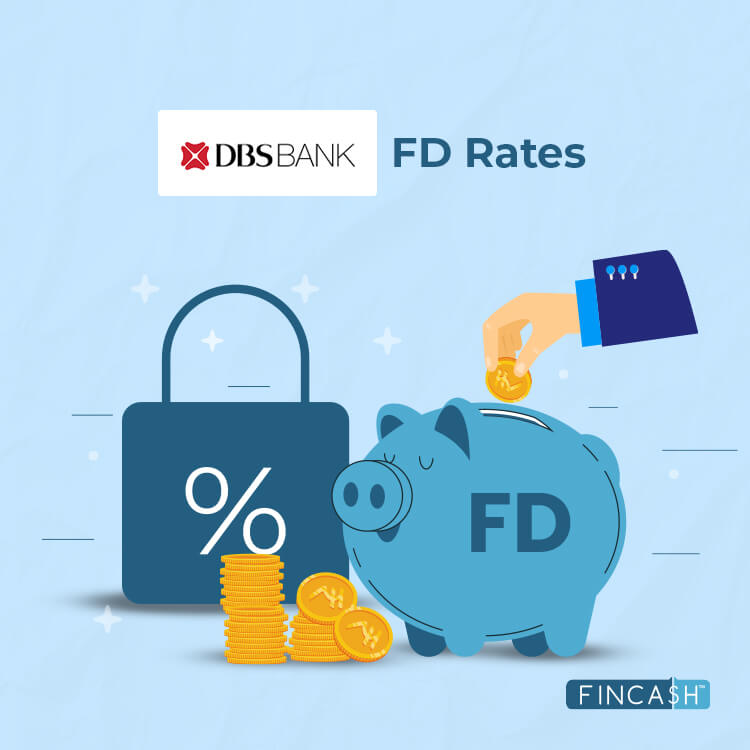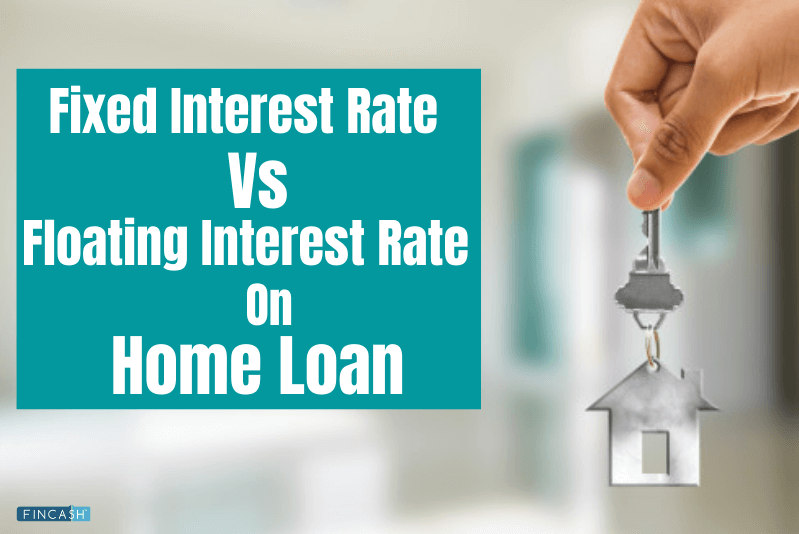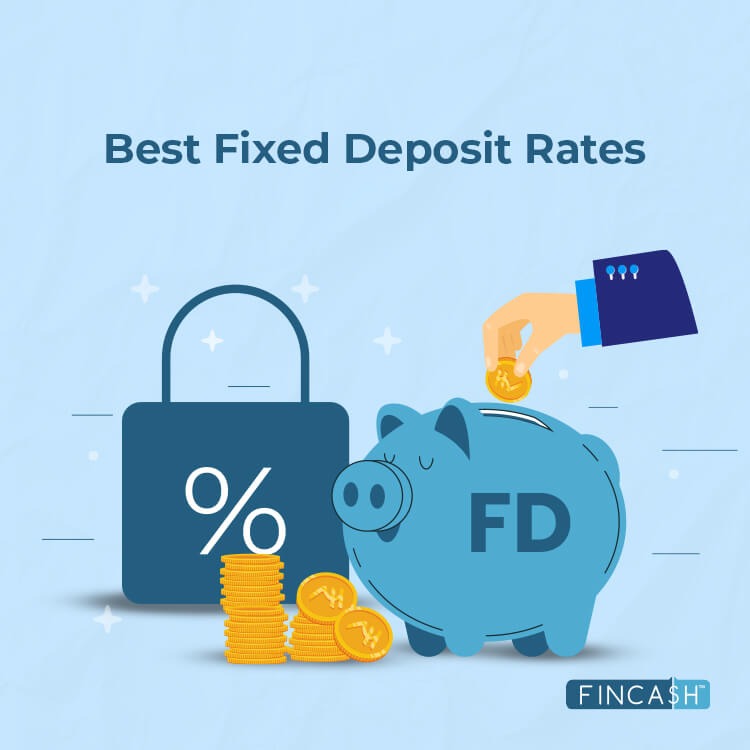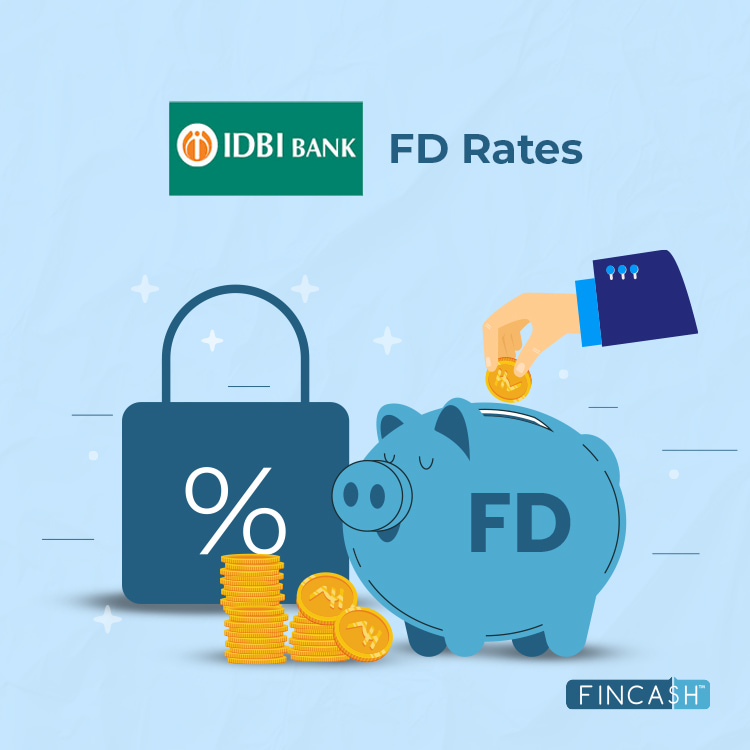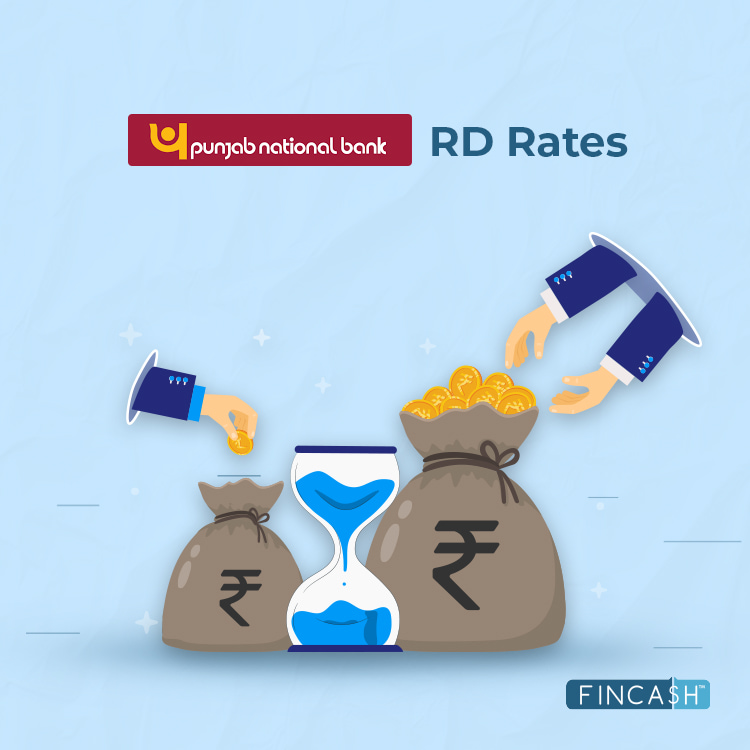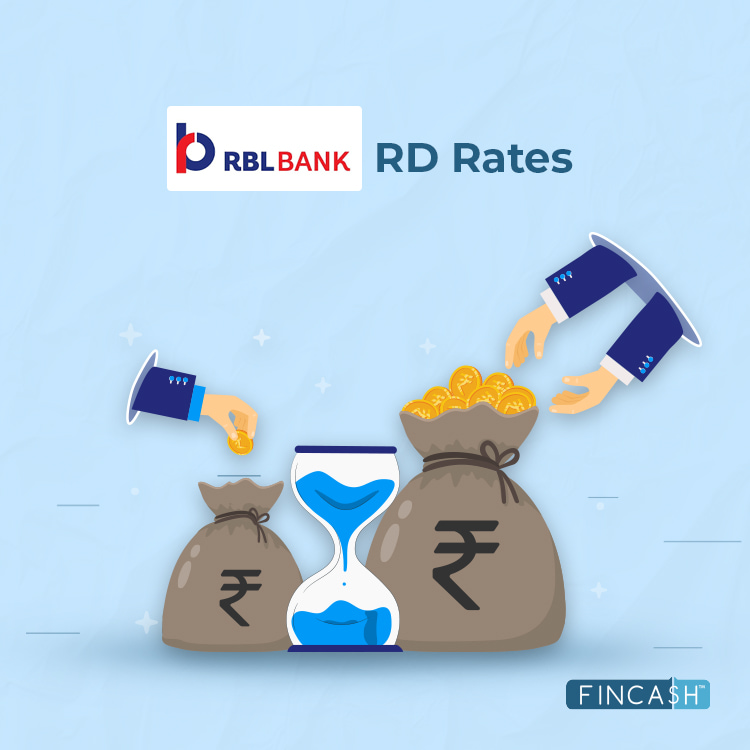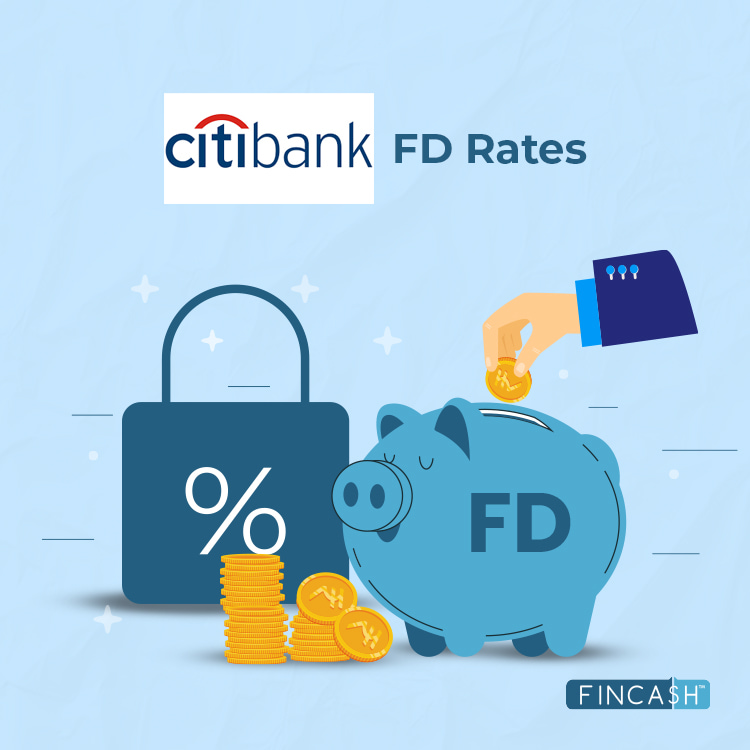
Table of Contents
- Fixed Deposit (FD)
- Type of FD Schemes
- How to Choose a Fixed Deposit?
- Why the FD Interest Rates Keep Fluctuating?
- FD Interest Rates 2025
- Various Banks FD Interest Rates
- Formula to Calculate Fixed Deposit Interest
- How to Open an FD Account?
- FAQs
- 1. Are the interest earned from FDs taxable?
- 2. How can you save on taxes on your FDs?
- 3. Which should I opt for a floating rate or standard rate of FD?
- 4. When should I opt for a standard rate of FD?
- 5. Why do FDs have higher interest rates than savings deposits?
- 6. Is the interest formula for calculating FDs the same for all banks?
- 7. Can I use my FD to save on my taxes?
- 8. What benefit will the bank give me if open a term deposit account?
- 9. Can I withdraw the principal amount before the tenure expires?
- 10. Is it possible to take a loan against fixed deposit?
Fixed Deposit (FD) Interest Rates 2025
Fixed Deposits (FD) have always been one of the popular modes of investment in India. It gives better returns as the interest rate offered are comparatively higher than Recurring deposit or Savings Account. The FD interest rates vary from 2.50% p.a. to 9.00% p.a, depending on the tenure of the investment. Senior citizens earn a higher rate of interest compared to the regular citizens.
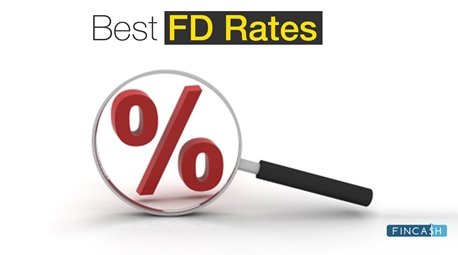
In this scheme, it is seen that the higher the tenure, the higher the interest rate and vice versa. Another advantage of this scheme is that investors can determine their potential Earnings by using the FD interest formula even before Investing!
Fixed Deposit (FD)
Fixed deposits are a great investment tool for risk-averse investors. FD scheme not only encourages a habit of healthy saving, but also provides high liquidity, so investors can exit at will. In this scheme, you can deposit a principal amount for a fixed tenure and upon maturity, you will get the principal amount along with the interest earned over the tenure. While investing, it is advisable that you compare FD interest rates of various banks and choose the one that gives you the desired returns.
Type of FD Schemes
1. Standard Fixed Deposit
These are regular Fixed Deposit schemes that have a wide range of fixed tenures ranging from 7 days to 10 years. The interest rates are determined at the time of deposit. The rate varies by issuer depending upon the deposited amount, the tenure, and whether it is a regular citizen or senior citizen scheme.
2. Floating Rate Fixed Deposit
Under this scheme, the FD interest rates are not fixed. It fluctuates during the tenure depending on the changing Reference Rate. This allows investors to take the benefits of a change in the FD rates (assuming it increases).
3. Tax Saving Fixed Deposit
Here investors can enjoy certain tax benefits, but is accompanied by certain limitations. The scheme has a minimum deposit period of five years and a maximum of 10 years. It doesn’t allow premature withdrawal or even a partial withdrawal till five years. But, under this scheme, an investor can claim deductions up to INR 1,50,000 on the money invested under Section 80C of the income tax Act, 1961. However, the interest earned on such FDs is fully taxable. tax saving FD interest rates vary from 5.00% to 8.00% p.a.
4. Senior Citizen Fixed Deposit
As the name suggests, this scheme is meant for those who are above 60 years of age. Generally, senior citizens get higher interest rates against a fixed deposit that typically from 3.00% to 8.50%. As far as the tenure is concerned, under such an FD, they remain flexible.
5. Cumulative Fixed Deposit
Under this scheme, the interest rates don’t stay fixed. This type of an FD helps corpus to grow significantly as the interest rate compounding is put into action every quarter or year and is paid during the time of maturity.
6. Non-Cumulative Fixed Deposit
This type of an FD is adequate for those who are either retired or living through pensions. With this scheme, interest rate is either paid monthly, quarterly, half-yearly or yearly according to the depositor’s choice. Also, post-retirement, having such type of an FD turns out to be a good investment option.
How to Choose a Fixed Deposit?
All around the country, FDs have been quite a popular option, courtesy to the security and safety of the invested principal amount that they offer. With an FD, managing financial objectives and ensuring future security becomes easier. Also, investments of fixed deposits can also involve securing the future of children by collecting funds for education, marriage, or any other unanticipated situations in the future. However, before you begin to choose a fixed deposit in a Bank of your choice, it is important that you keep these following points in mind.
1. Safety
Fixed deposits, undoubtedly, are the most secured investment options that boast of a guaranteed return. But most of the times, credit agencies don’t rate the Offering of FDs by corporates or other non-banking institutes. Thus, before making an investment, make sure that you cross-check the ratings of the agency cautiously.
2. Minimum Amount
Generally, the amount of deposit varies from a bank to a bank. Each one of them has defined a maximum and minimum limit. Therefore, the experts recommend that you dive into this Factor wisely before putting your money.
3. Tenure
Under a fixed deposit, the tenure may range anywhere from 7 days to 10 years. At the end of the day, choosing what best suits your requirements is of utmost importance.
The reason behind this is because premature withdrawal may come with massive penalties that may lead to a huge reduction in the total amount of interest earned upon the investment.
4. Tax Deduction
Under the section 80C of the Income Tax Act, fixed deposits provide tax exemption. You can easily claim a maximum of Rs. 1.5 lakhs through an FD. This way, along with resting assured of a regular future income, you can also save a bomb with Taxes.
5. FD Interest Rates
In terms of an interest rate, different banks offer varying rates. It majorly depends upon the discretion, the investment amount and the tenure. Since they are not fixed rates, make sure you research well enough before choosing a deal.
Why the FD Interest Rates Keep Fluctuating?
Basically, the fixed deposit interest rate is a factor of the Economy’s situation and the consistent monetary policy adoptions by the Reserve Bank of India (RBI).
Some of the factors that lead to an increase or decrease in the rates of the fixed deposit are mentioned as below:
- The rates of fixed deposit are linked to the Inflation rates as investors anticipate a positive return
- Although proper liquidity situation doesn’t compel borrowers toward aggressive borrowing rate, this is opposite during the times of tight liquidity position
- The expectations of alterations in the monetary policy or cut-off in lending rates
- Supply and demand conditions for credit may lead to changes in the fixed deposit rates
- Borrowers own fund costs, falling Call rates, credit demand and other similar factors may also cause a variation in these rates
FD Interest Rates 2025
Here is a list of FD interest rates offered by various banks. The interest rates for FDs have been grouped according to the standard FD scheme and senior citizen FD scheme.
| Bank Name | FD Interest Rates (p.a.) | Senior Citizen FD Rates (p.a.) |
|---|---|---|
| Axis Bank FD | 6.70% - 7.10% | 3.50% - 7.75% |
| Bandhan Bank FD | 5.85% - 7.85% | 3.75% - 8.35% |
| Bank of Baroda FD | 6.50% - 7.25% | 7.15% - 7.50% |
| Canara Bank FD | 6.70% - 7.25% | 4.0% - 7.20% |
| Central Bank of India FD | 3.00% - 5.74% | 3.25% - 6.10% |
| DBS Bank FD | 6.25% - 7.50% | 2.50% - 8.0% |
| Duetsche Bank FD | 7.0% - 8.0% | 3.00% - 8.0% |
| HDFC Bank FD | 6.60% - 7.20% | 3.50% - 7.75% |
| HSBC Bank FD | 4.00% - 7.25% | 3.35% - 7.50% |
| ICICI Bank FD | 6.70% - 7.10% | 3.50% - 7.65% |
| IDBI Bank FD | 6.50% - 7.25% | 3.50% - 7.50% |
| IDFC First Bank FD | 6.50% - 7.75% | 3.50% - 8.0% |
| Indian Bank FD | 6.10% - 7.25% | 6.60% - 6.75% |
| Indian Overseas Bank FD | 6.50% - 7.10% | 4.5% - 7.75% |
| IndusInd Bank FD | 7.25% - 7.85% | 4.25% - 8.25% |
| Kotak Mahindra Bank FD | 6.20% - 7.25% | 6.70% |
| Punjab National Bank FD | 6.50% - 7.25% | 3.5% - 7.75% |
| RBL Bank FD | 7.10% - 8.0% | 4.0% - 8.30% |
| SBM Bank FD | 7.05% - 8.25% | 4.75% - 8.75% |
| State Bank of India FD | 6.50% - 7.10% | 3.50% - 7.50% |
| UCO Bank FD | 6.20% - 6.50% | 3.15% - 7.60% |
| Yes Bank FD | 3.25% - 7.75% | 3.75% - 8.25% |
Disclaimer- The FD Interest Rates are subject to frequent change. Before starting a Fixed Deposit scheme, do inquire with the concerned banks or visit their websites.
Talk to our investment specialist
Various Banks FD Interest Rates
Here's a detailed FD interest rates of various banks as per investment tenure and investment amount.
Union Bank of India FD Interest Rates
Here's the list of Union Bank FD Rates, applicable for deposits of <INR 2 Crore.
| Tenure | FD Interest Rates (p.a.) |
|---|---|
| 7-14 Days | 3.00% |
| 15 -30 Days | 3.00% |
| 31-45 Days | 3.00% |
| 46 -90 Days | 4.05% |
| 91-120 Days | 4.30% |
| 121-180 Days | 4.40% |
| 181 Days to <1 Year | 5.25% |
| 1 Year | 6.30% |
| >1 Year to 398 Days | 6.30% |
| 399 Days | 7.00% |
| 400 Days to 2 Years | 6.30% |
| >2 Years to less than 3 Years | 6.30% |
| 3 Years | 6.50% |
| > 3 Years to 5 Years | 6.70% |
| >5 Years to 10 Years | 6.70% |
*Interest rates are subject to change. Therefore the depositor website will ensure the rates up to the date of deposit
SBI FD Interest Rates
State Bank of India (SBI) Fixed Deposit Rates for deposits below INR 2 crore.
| Tenure | FD Interest Rates (p.a.) |
|---|---|
| 7 days to 45 days | 3.00% |
| 46 days to 179 days | 4.50% |
| 180 days to 210 days | 5.35% |
| 211 days to less than 1 year | 5.88% |
| 1 year to less than 2 years | 6.98% |
| 2 years to less than 3 years | 7.19% |
| 3 years to less than 5 years | 6.66% |
| 5 years and up to 10 years | 6.66% |
IDBI Fixed Deposit Interest Rates
Here's a list of IDBI FD Interest rates for deposits of below INR 2 crore.
| Tenure | FD Interest Rates (p.a.) |
|---|---|
| 0-6 Days | NA |
| 07-30 days | 3.00% |
| 31-45 days | 3.25% |
| 46 - 90 days | 4.00% |
| 91 days to 6 months | 4.50% |
| 6 months 1 day to 270 days | 5.75% |
| 271 days to <1 Year | 6.25% |
| 1 Year to 2 Years (except 375 Days and 444 Days) | 6.80% |
| >2 Years to <3 Years | 7.00% |
| 3 Years to 5 Years | 6.50% |
| >5 Years to 10 Years | 6.25% |
| >10 Years to 20 Years | 4.80% |
| 5 years | 6.50% |
$Maturity bucket is eligible only for deposits from following beneficiaries (with effect from January 1st, 2021)
HDFC FD Rates
Here's the list of HDFC FD interest rates applicable for deposits of below INR 2 crore.
| Tenure | FD Interest Rates (p.a.) |
|---|---|
| 7 - 14 days | 3.00% |
| 15 - 29 days | 3.00% |
| 30 - 45 days | 3.50% |
| 46 - 60 days | 4.50% |
| 61 - 89 days | 4.50% |
| 90 days < = 6 months | 4.50% |
| 6 months 1 days <= 9 months | 5.75% |
| 9 months 1 day to < 1 year | 6.00% |
| 1 year to < 15 months | 6.60% |
| 15 months to < 18 months | 7.10% |
| 18 months to < 21 months | 7.00% |
| 21 months - 2 years | 7.00% |
| 2 years 1 day - <2 years 11 months | 7.00% |
| 2 years 11 months - 35 months | 7.15% |
| 2 years 11 months 1 day < = 3 years | 7.00% |
| 3 years 1 day - < 4 years 7 months | 7.00% |
| 4 years 7 months - 55 months | 7.20% |
| 4 years 7 months 1 day < = 5 years | 7.00% |
| 5 years 1 day - 10 years | 7.00% |
Bank of India FD Rates
The above rates are applicable for deposits of below INR 2 crore.
| Tenure | FD Interest Rates (p.a.) |
|---|---|
| 7 days to 14 days | 3.00% |
| 15 days to 30 days | 3.00% |
| 31 days to 45 days | 3.00% |
| 46 days to 90 days | 4.50% |
| 91 days to 179 days | 4.50% |
| 180 days to 210 days | 5.50% |
| 211 days to 269 days | 5.50% |
| 270 days to > 1 year | 5.75% |
| 1 year | 6.50% |
| Above year to > 2 years | 6.50% |
| 2 years | 7.25% |
| Above 2 years to > 3 years | 6.75% |
| 3 years to > 5 years | 6.50#% |
| 5 years to > 8 years | 6.00#% |
| 8 years & above to 10 years | 6.00#% |
*Minimum Deposit Rs.1 Lakh
#Additional premium of 25 bps, over & above the existing 50 bps will be paid to Senior Citizen’s on their retail TD (Less than Rs. 2 Cr) for all the tenors of 3 Years & above i.e. 75bps.
Bank of Baroda FD Interest Rates
The above rates are applicable for deposits of <INR 2 crore.
| Tenure | FD Interest Rates (p.a.) |
|---|---|
| 7 days to 14 days | 3.00% |
| 15 days to 45 days | 3.50% |
| 46 days to 90 days | 5.00% |
| 91 days to 180 days | 5.00% |
| 181 days to 210 days | 5.50% |
| 211 days to 270 days | 6.00% |
| 271 days & above and less than 1 year | 6.25% |
| 1 year | 6.75% |
| Above 1 year to 400 days | 6.75% |
| Above 400 days and up to 2 years | 6.75% |
| Above 2 years and up to 3 years | 7.25% |
| Above 3 years and up to 5 years | 6.50% |
| Above 5 years and up to 10 years | 6.50% |
| Above 10 years (MACT/MACAD Court Order schemes only) | 6.25% |
| 399 days (Baroda Tiranga Plus Deposit Scheme) | 7.15% |
Formula to Calculate Fixed Deposit Interest
Even though FD interest rates vary bank to bank, investors can still determine their potential earnings by using FD interest formula.
FD Interest Rate Formula- A=P(1+r/n)^nt
Where,
- A= Maturity Value
- P= Principal Amount
- r= Rate of Interest
- t= Number of Years
- n= Compound Interest Frequency
Using the FD Interest Formula investors can determine their potential earnings.
Illustration- If you invest INR 5000 monthly with an annual interest rate of 6% p.a. which is compounding annually, then after 5 years your total invested amount of INR 300,000 will grow to INR 3,49,121. That means, you are making a net profit of INR 49,121.
Using the above formula, investors can estimate the interest earned and the maturity value of the principal amount.
How to Open an FD Account?
The procedure for opening an FD account can be completed both online and offline. These days, a majority of banks provide both the facilities to choose from.
All you would have to do is fill up the necessary form and submit a few documents.
Opening an FD Account Online
If your KYC is completed with the bank already, you can open an FD account online. This way, you wouldn’t have to submit the documents. To do so, follow these steps:
- First of all, ensure that you have an account with the desired bank
- Then, log into your current or saving account through net banking
- Click on the Menu where you will find transaction/deposit option
- Choose the Fixed Deposit and click on 'new fixed deposit account'
- Fill in all the details as asked, including the nominee, tenure, principal amount and more
- Thereafter, the set amount will automatically get debited from your account
- You will then receive a downloadable online Receipt
Opening an FD Account Offline
If you don’t have access to net banking, you can also open a fixed deposit account offline by following these steps:
- Visit the nearest branch of the chosen bank and fill the fixed deposit application form
- If you don’t have an existing account with the bank, submit the KYC documents, such as address proof, identity proof, Pan card, and more
- Submit these documents along with the signed and properly filled application form
- Deposit the amount either through Debit Card, online transfer or a cheque
And you are done.
FAQs
1. Are the interest earned from FDs taxable?
A- Yes, interests earned from FDs are taxable. Banks deduct a TDS of 10% on FDs if the interest income is above Rs. 10,000. And 20% if the PAN has not been provided. You are expected to pay an additional 10% tax if you fall under the higher income bracket.
2. How can you save on taxes on your FDs?
A- If you opt for a Tax Saving deposit scheme, you can save taxes on your FDs. You will have to invest for a minimum period of five years and a maximum of ten years. The investment amount cannot exceed 1.5 lakh rupees.
3. Which should I opt for a floating rate or standard rate of FD?
A- In a floating rate, interest rate moves in tandem with a reference rate, which is periodically reset. This gives you an advantage of the interest rate changes without closing and re-booking the FD. At certain times you will make more than the standard rate.
4. When should I opt for a standard rate of FD?
A- If you do not want the interest rate to change, you should opt for your FD's standard rate. It is best if you do not want to take any risk with your investment.
5. Why do FDs have higher interest rates than savings deposits?
A- Fixed deposits have a higher tenure and cannot be withdrawn before maturity. If you withdraw before maturity, then you will have to pay the penalty. Hence, the banks pay higher interest rates on the FDs compared to savings deposits.
6. Is the interest formula for calculating FDs the same for all banks?
A- Yes, banks use the same formula to calculate interest for FDs. So whether you are opening an FD in a nationalized bank or a privatized bank, the interest calculation formula will be the same.
7. Can I use my FD to save on my taxes?
A- As per the 80C of Income Tax Act, you can save taxes up to 1.5 lakh rupees on your FDs. Beyond this amount, your FDs become taxable.
8. What benefit will the bank give me if open a term deposit account?
A- Banks provide a higher rate of interest compared to a savings account. You will get the amount as interest payable on the money invested as a fixed deposit.
9. Can I withdraw the principal amount before the tenure expires?
A. Yes, you can. However, to do so, make sure that the bank is providing you a premature Facility with the fixed deposit. Also, keep in mind that while doing so, you may have to pay a penalty.
10. Is it possible to take a loan against fixed deposit?
A. Yes, you can pledge your fixed deposit to take a loan. Most of the banks provide anywhere between 90% to 95% of the fixed deposit amount as a loan. However, this will strictly depend upon the bank and the amount that you have in your fixed deposit account.
All efforts have been made to ensure the information provided here is accurate. However, no guarantees are made regarding correctness of data. Please verify with scheme information document before making any investment.
